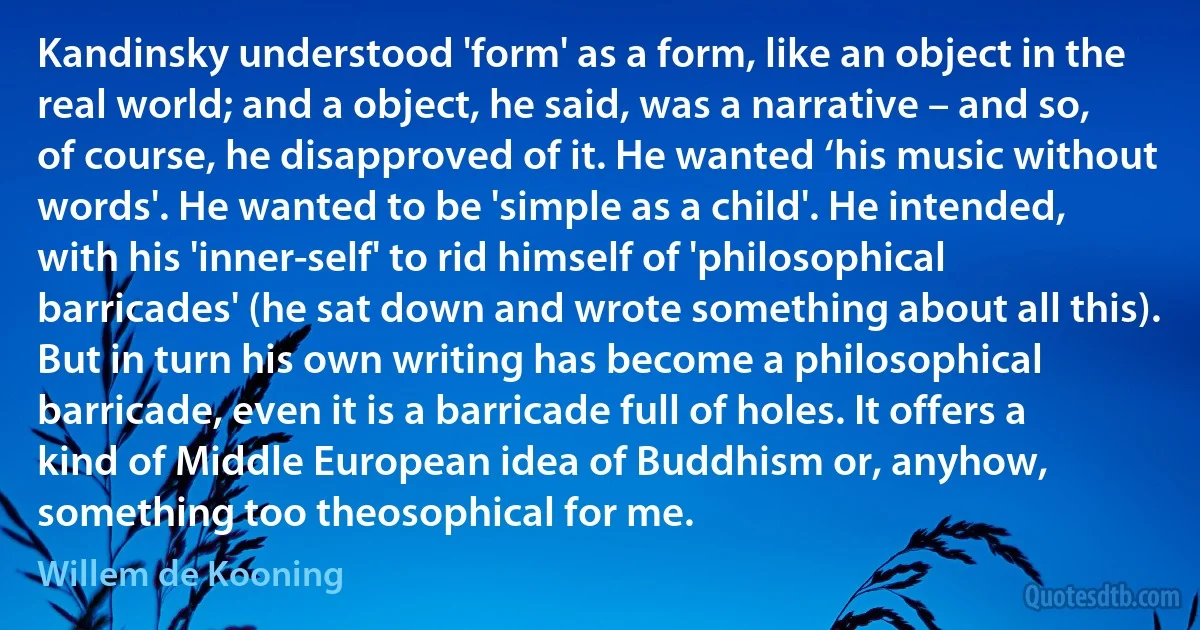
Kandinsky understood 'form' as a form, like an object in the real world; and a object, he said, was a narrative – and so, of course, he disapproved of it. He wanted ‘his music without words'. He wanted to be 'simple as a child'. He intended, with his 'inner-self' to rid himself of 'philosophical barricades' (he sat down and wrote something about all this). But in turn his own writing has become a philosophical barricade, even it is a barricade full of holes. It offers a kind of Middle European idea of Buddhism or, anyhow, something too theosophical for me.
Willem de KooningRelated topics
barricade buddhism child course form full idea kind middle music narrative real rid say simple something turn world words KandinskyRelated quotes
The inferno of the living is not something that will be; if there is one, it is what is already here, the inferno where we live every day, that we form by being together. There are two ways to escape suffering it. The first is easy for many: accept the inferno and become such a part of it that you can no longer see it. The second is risky and demands constant vigilance and apprehension: seek and learn to recognize who and what, in the midst of inferno, are not inferno, then make them endure, give them space.

Italo Calvino
This is sad. I just think it's a little ridiculous we are still only looking at the surface of one another. Red hair? Blue hair? Pink? Blonde? Short? Long? Whatever. We might as well shave our heads. Hair has nothing to do with the reason we playing music. It's a style. Something that will never last as long as the songs we play and the words we sing. Listen up ladies in bands, I'm so proud to be one of you and I don't care if we all look exactly alike or if we are all carbon copies of each other. We have things to say and it's up to us to get people to not just look but to LISTEN!

Hayley Williams
When the great religious and philosophical conceptions were alive, thinking people did not extol humility and brotherly love, justice and humanity because it was realistic to maintain such principles and odd and dangerous to deviate from them, or because these maxims were more in harmony with their supposedly free tastes than others. They held to such ideas because they saw in them elements of truth, because they connected them with the idea of logos, whether in the form of God or of a transcendental mind, or even of nature as an eternal principle.

Max Horkheimer
Then something unexpected happens. At least, I don't expect it because I don't think of District 12 as a place that cares about me. But a shift has occurred since I stepped up to take Prim's place, and now it seems I have become someone precious. At first one, then another, then almost every member of the crowd touches the three middle fingers of their left hand to their lips and holds it out to me. It is an old and rarely used gesture of our district, occasionally seen at funerals. It means thanks, it means admiration, it means good-bye to someone you love.

Suzanne Collins
In these sentiments, Sir, I agree to this Constitution, with all its faults, - if they are such; because I think a general Government necessary for us, and there is no form of government but what may be a blessing to the people, if well administered; and I believe, farther, that this is likely to be well administered for a course of years, and can only end in despotism, as other forms have done before it, when the people shall become so corrupted as to need despotic government, being incapable of any other.

Benjamin Franklin
